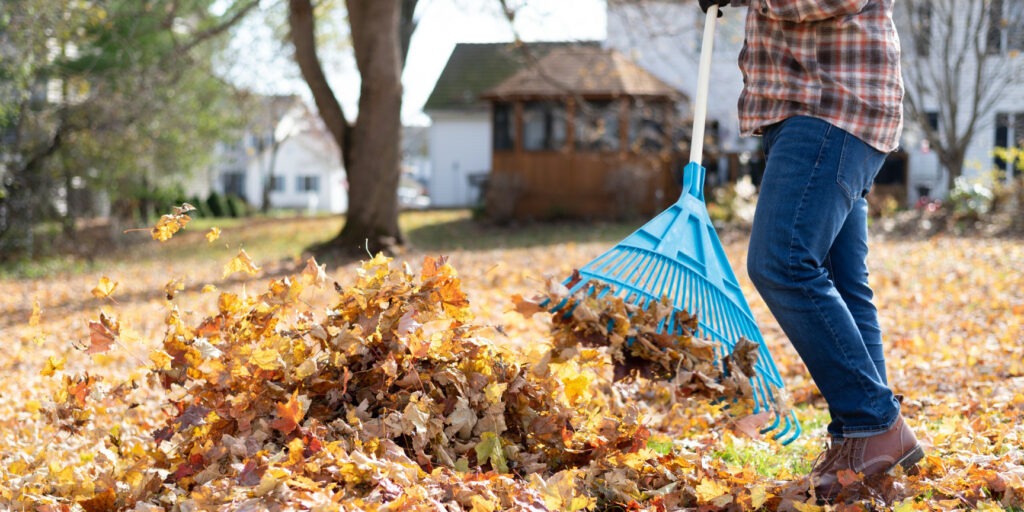If you have big shade trees in your yard, the fall season adds a new chore to your list: dealing with mountains of leaves. Is it better to rake or mulch? In most cases, mulching offers more long-term benefits to your lawn, but there are some instances where raking or blowing leaves can help.
Mulching involves shredding leaves to enrich the soil, while raking collects leaves for disposal. Mulching is eco-friendly and beneficial for lawn health, promoting nutrient recycling and moisture retention. Raking, though labor-intensive, can provide a tidy appearance and prevent grass smothering.
Mulching vs. Raking Leaves
When it comes to autumn yard care, homeowners often face the choice between mulching and raking leaves. Each method has its benefits, impacting lawn health and maintenance practices.
Mulching
Mulching is an eco-friendly and efficient way to manage fallen leaves while benefiting your lawn. It enriches the soil as the shredded leaves break down, returning valuable nutrients to the grass.
Mulching comes with plenty of benefits that include:
- Improved soil health
- Enhanced moisture retention
- Reduced need for fertilizers
Additionally, mulched leaves create a protective layer that helps insulate the soil during winter, promoting healthier grass growth in the spring.
Raking
The benefit of raking your lawn is that removing leaves allows your grass to breathe. It also prevents smothering from thick leaf layers, which can lead to diseases like snow mold. Raking also has the benefit of providing a clean, tidy appearance. This enhances curb appeal and allows for easy removal of other debris like twigs.
While mulching is generally preferred, raking might be necessary in certain situations. If you prioritize a pristine lawn appearance, raking can provide a cleaner, more manicured look.
Specific lawn care techniques, such as overseeding, may also require raking to ensure proper seed-to-soil contact. Additionally, some homeowners prefer to rake leaves for use in compost piles or as garden mulch, repurposing this natural resource for other landscaping needs. In these cases, raking can be a beneficial alternative to mulching.
Possibly the biggest downside of raking is that it’s labor-intensive and time-consuming, especially for large yards. Fortunately, Knoxville has free leaf collection from November to February to make things a bit easier.
The Golden Rule: Avoid Smothering Your Grass
When choosing between mulching and raking, the most important consideration is preventing grass from being smothered by thick leaf layers. Excessive leaves can block air and light, leading to unhealthy grass and promoting conditions for winter pests and diseases like snow mold.
Maintaining proper air circulation and light exposure is crucial for grass health, as it encourages growth and resilience. Making sure that your lawn remains clear of dense leaf coverage is essential for its vitality throughout the fall and even winter.
How To Prepare for Fall Lawn Care
Preparing your lawn for fall in Tennessee helps set you up for success for the growing season in late March or April. Managing leaves through mulching or raking to prevent smothering creates an ideal environment for fall fertilizer application, allowing nutrients to reach the soil effectively.
Aeration is most effective in early fall when the grass is actively growing. This process reduces soil compaction and improves nutrient absorption. Proper leaf management complements aeration and fertilization by ensuring the even distribution of treatments and preventing moisture buildup. These practices collectively benefit Tennessee’s growing season by strengthening root systems, enhancing nutrient uptake, and preparing the lawn for winter dormancy, resulting in a healthier, more resilient lawn come spring.
Choose Grover Turf Care for Your Fall Turf Care Needs
Grover Turf Care stands out as the premier choice for fall lawn needs in West Knoxville. Our expertise in fall lawn care is evident in our comprehensive approach, which includes core aeration and overseeding with tall fescue turf to relieve soil compaction and promote healthy growth.
Our customized approach addresses specific nutritional deficiencies, ensuring your lawn receives tailored care. We offer a full range of fall turf care services including fungicide treatments to combat turf diseases common in Tennessee’s climate. With our specialized knowledge in turfgrass cultivation and local soil conditions, Grover Turf Care provides expert care to cultivate a vibrant, resilient lawn throughout the year.





